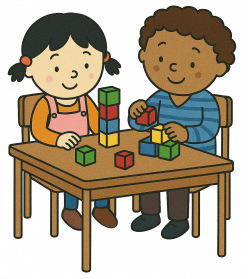The Power of Play in Key Stage One
The Role of Play in Developing Fine Motor Skills
Play is a vital component of Key Stage One education as it supports the development of fine motor skills. Activities such as threading beads, playing with clay, or engaging in construction toys require the use of small muscles in the hands and fingers. These activities enhance children's ability to perform tasks such as writing and drawing with precision, laying a strong foundation for future academic tasks. 
Moreover, play activities that involve manipulation and control, like puzzles and cutting with scissors, further develop hand-eye coordination. Such activities are not only enjoyable for young children but also serve as important exercises for fine motor skill enhancement. Through engaging in these tasks, children can refine their dexterity and precision, essential for academic success.
Building Strength and Stamina Through Play
Engaging in play activities helps build strength and stamina in young children, preparing them for more structured physical activities in later stages. Active games such as climbing, running, and jumping enhance cardiovascular fitness and muscle strength. These activities promote physical development and are fundamental in supporting children's health and well-being. 
Types of play that involve outdoor exploration, such as playing on playground equipment or participating in team sports, further contribute to physical strength. Such activities encourage children to move their bodies in various ways, helping improve balance, coordination, and overall physical endurance. Play at this stage lays the groundwork for a lifelong appreciation for active and healthy lifestyles.
The Importance of Taking Breaks for Enhanced Focus
Taking regular breaks from traditional learning through play can significantly enhance children's ability to focus and absorb new information. Research suggests that short play breaks interspersed with learning sessions can improve concentration and memory retention. By providing a mental reset, these breaks enable children to return to tasks with renewed energy and focus.
The impact of play breaks on children's focus and retention is profound, as it allows them to process information subconsciously. Even short periods of unstructured play can refresh children's minds and increase their cognitive receptiveness. Thus, incorporating play into the school day is a strategic approach to maintaining high levels of academic engagement and productivity.
Fostering Creativity and Critical Thinking with Play
Learning through play encourages creativity, problem-solving, and critical thinking skills, which are essential for cognitive development. Imaginative play and role-playing scenarios provide children with opportunities to explore different perspectives and come up with novel solutions. These activities stimulate the brain, promoting creative thinking processes that are vital throughout life.
Examples of play activities that encourage creative and critical thinking include building with blocks, storytelling, and pretend play. These activities challenge children to think outside the box and devise innovative strategies. Through such playful engagements, children develop the ability to approach problems creatively and analytically, which are important skills in academic and real-world settings.
Social Interaction and Emotional Intelligence Through Play
 Play provides opportunities for social interaction and collaboration, helping children develop communication skills and emotional intelligence. Games that involve sharing, negotiating, and cooperating foster an understanding of social dynamics and empathy. Children learn to express themselves, listen to others, and work as part of a team.
Play provides opportunities for social interaction and collaboration, helping children develop communication skills and emotional intelligence. Games that involve sharing, negotiating, and cooperating foster an understanding of social dynamics and empathy. Children learn to express themselves, listen to others, and work as part of a team.
Examples of play settings that support social interaction include group games like "Simon Says" or cooperative storytelling. These environments encourage children to engage in dialogue, practice patience, and develop leadership skills. As a result, children enhance their emotional intelligence, which is crucial for forming healthy relationships and succeeding in collaborative environments.
A Balanced Approach to Education with Play
Incorporating play into the curriculum supports a balanced approach to education, promoting physical, emotional, and intellectual growth. Playful learning environments can increase motivation and enthusiasm for learning, making education an enjoyable and engaging experience for children. This approach ensures that children do not view education as a mere obligation but as a dynamic and fulfilling journey.
Benefits of a balanced educational approach through play include a more holistic development of the child. Play fosters a love for learning by integrating fun and creativity into educational activities. By blurring the lines between work and play, children can achieve a more well-rounded education that addresses their diverse developmental needs.
Increasing Motivation and Enjoyment in Learning
Playful learning environments can significantly increase children's motivation and enthusiasm for learning. When children associate learning with fun, they are more likely to engage actively and persistently in educational activities. This positive reinforcement encourages children to explore new topics with curiosity and excitement.
The role of play in making learning an enjoyable experience is evident in its ability to transform traditional educational settings into vibrant and stimulating environments. By incorporating elements of play, such as games and interactive activities, teachers can maintain children's interest and foster a lifelong love for learning. This approach not only benefits the children but also enhances the overall educational experience.
